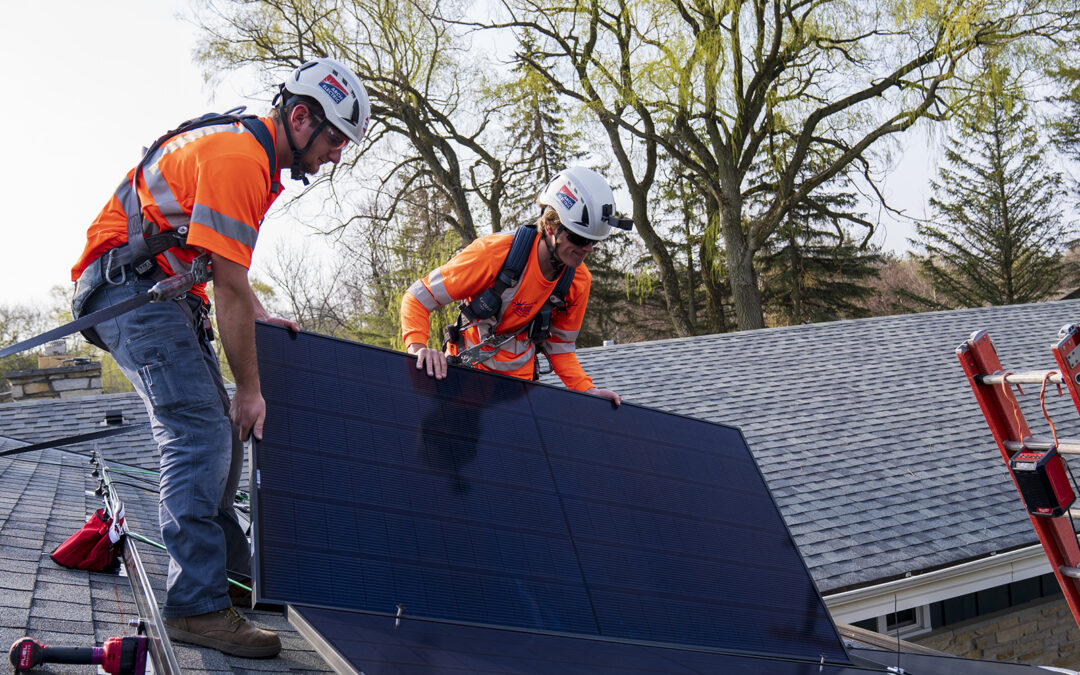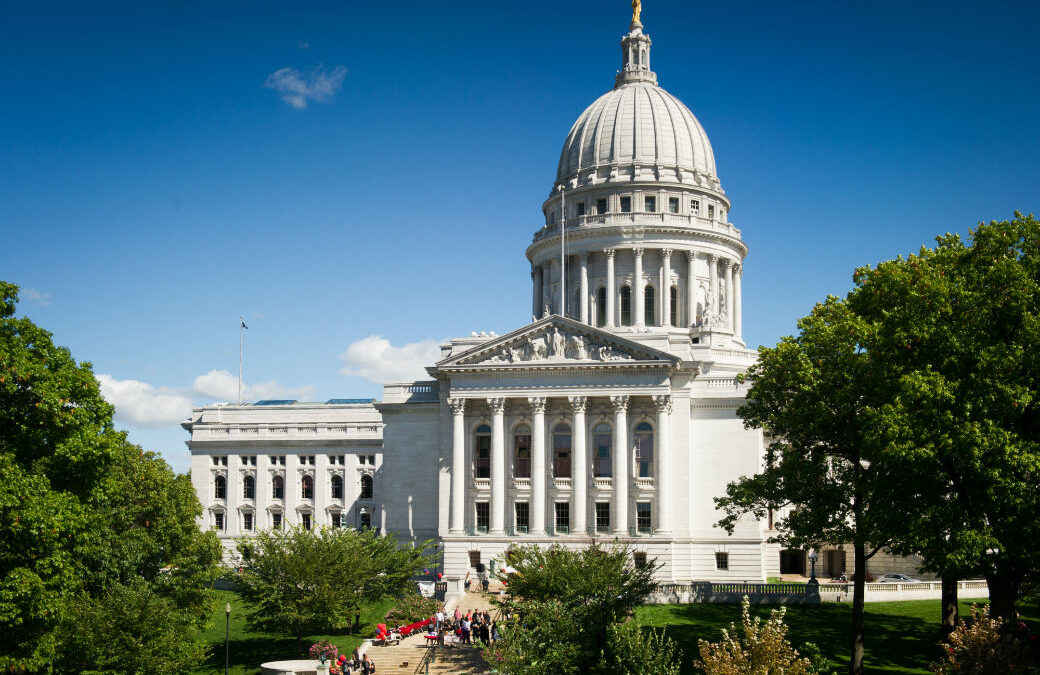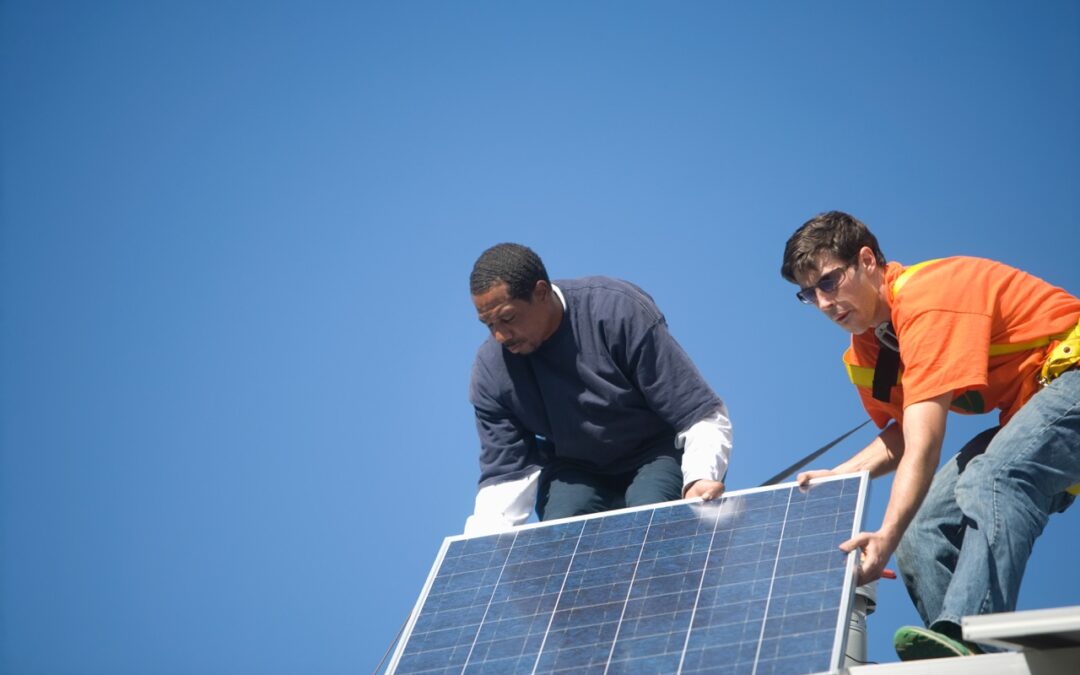
by RENEW Wisconsin | Apr 23, 2024 | Advocacy, Electrification, Press Release, Solar
The Environmental Protection Agency (EPA) has announced the recipients of the Solar for All grants, with $124 million in funding awarded to the Wisconsin Economic Development Corporation (WEDC) and Midwest Tribal Energy Resources Association (MTERA). This influx of resources will help to accelerate our state’s clean energy transition.
Solar for All will increase access to renewable energy for around 15,000 Wisconsin homes, including single-family, multi-family, or community solar projects. The grant awarded to WEDC will bring $62,450,000 to the state of Wisconsin, this historic investment will increase solar access for Wisconsinites across both rural and urban communities.
This down payment on our state’s clean economy signals a new day for renewable energy solutions for all Wisconsinites. RENEW applauds this critical step toward increased solar access and how it ensures every community can participate and benefit from clean energy. Communities across the state will experience reduced reliance on fossil fuels and expanded clean energy job creation as we build a healthier, more equitable clean energy future.
More on Solar for All:
• The Solar for All competition, which was created by the Inflation Reduction Act’s Greenhouse Gas Reduction Fund (GGRF), will expand the number of low-income and disadvantaged homes primed for residential solar investment.
• Wisconsin is one of 60 states, territories, Tribal governments, municipalities, and eligible nonprofits awarded grants to create and expand low-income solar programs that provide financing and technical assistance, such as workforce development, to enable low-income and disadvantaged households and communities to deploy and benefit from residential solar.
• The Solar for All competition will provide more than $7 billion nationwide to increase access to affordable, resilient, and clean solar energy for millions of low-income households.
RENEW congratulates Governor Tony Evers, WEDC, and MTERA on their work to ensure our state continues to bring renewable energy commitments to our state. This funding will help advance environmental justice efforts by enabling low-income households to access clean, resilient solar power, lowering energy costs, and creating good jobs in underserved areas.

by Beata Wierzba | Mar 14, 2024 | Advocacy, Electric Vehicles, Legislative Watchlist, Local Government, NEVI, Solar
As the legislature wraps up for this session, RENEW is celebrating several victories and reflecting on some of the other renewable energy measures being considered by the state legislature.
Big Win for Electric Vehicle Infrastructure
Senate Bill 791, the Electric Vehicle Charging Bill, passed the legislature with several amendments. The legislation exempts private entities that develop charging stations from being regulated as a public utility but allows them to measure the cost of electricity used for charging EVs by the kilowatt hour (kWh). Establishing this new kWh standard to calculate how much electricity is used, rather than how long it takes to charge the vehicle, provides an essential uniform requirement for the industry. It is also required by the National Electric Vehicle Infrastructure (NEVI) Program for Wisconsin to qualify for $78 million dollars in federal funding, an 80% cost share, for level 3 chargers to build corridors for charging. RENEW will be developing a detailed overview of the passed legislation for those interested in more information. The bill received bipartisan support and limited opposition. In other actions related to electric vehicles, the Legislature also passed SB 792, which establishes the infrastructure program and enables the state to utilize the federal NEVI funding. Additionally, with the passage of SB 617, the DOT will issue registration plates or stickers for existing license plates that indicate the vehicle is electric.
Progress on Community Solar
The community solar bill, Assembly Bill 258, did not pass either the Senate or Assembly but did get a hearing in the Assembly Committee on Energy & Utilities. This is a significant development considering the heavy opposition from Wisconsin Utilities. The public hearing was a great opportunity for the benefits of community solar to be shared with state legislators. During the hearing, supporters of community solar were able to answer questions, correct misinformation, and show their unity and strength. Establishing a community solar program for renewable energy generation is essential for those without the option to install panels on their own roofs, or the financing necessary to cover costs. Under the community solar arrangement, the participants subscribe to the developed project and receive a credit on their electric bill for solar electricity generated on panels installed in a community setting. The developer arranges permitting, financing, and installation, as well as maintenance. If passed, the legislation would require approval of the location by local governments and be limited to 5 megawatts or about 26 acres. Each project would also require at least four subscribers. With fierce opposition in some areas to larger utility-scale operations, the community solar model is a better fit.
Other Legislative Wins
There were numerous bills that aimed to limit renewable energy development, including restrictive sitting and increased regulation. They did not pass, and in most cases, did not receive a hearing. These bills ultimately died in committee.
Assembly Joint Resolution 6
Assembly Joint Resolution 6 (AJR6) would give the Wisconsin Legislature control over how federal funds are spent, rather than the Governor, on behalf of the state. Recent examples of federal funds distributed to the states include the Inflation Reduction Act (IRA) and the Bipartisan Infrastructure Law (BIL), both have benefited Wisconsin’s clean economy. The Wisconsin constitution directs the Governor, as head of state, to oversee disbursement. In order to change the constitution, identical legislation has to pass the legislature twice in a row and then be considered by state voters. Because it is not regular legislation but a joint resolution of the legislature, the Governor does not have veto power. After the passage, the resolution language will become the referendum during an upcoming election, with the resolution language being the exact question asked. If voters approve the referendum, the state will need to modify the constitution. The consequences of this change can impact many efforts, such as conservation measures, disaster relief funds, higher education, and more. The earliest statewide election when this referendum can be placed on the ballot is the August primary. Efforts are on the way to provide information and educate the voters on the impact the change could have on issues of importance to them.

by Beata Wierzba | Jan 23, 2024 | Advocacy, Electric Vehicles, Local Government, Public Service Commission
Wisconsin’s state legislature has acted swiftly this January to move legislation impacting electric vehicles (EV) through the legislative process. The Senate version of the proposed EV bill, SB 791, has already passed through the Senate Utilities & Technology Committee with a recommendation for passage. Similarly, the Assembly version of the bill, AB 846, cleared the State Assembly Committee on Energy & Utilities.
The legislation also passed through the Joint Committee on Finance and Joint Survey Committee on Tax Exemptions, gathering favorable votes. Most recently, the full Senate passed their version of the bill in a 30-2 vote. The next step is a vote by the full Assembly after which the bill will go to the Governor’s desk.
As with all legislative bills, amendments and tweaks along the way are common. There have been three amendments added so far, and we are analyzing the impact of these on the original bill.
The focus of the bill is to allow non-utilities to seek payment from EV drivers based on the amount of electricity they use to charge their vehicles rather than the time it takes for the vehicle to charge. This qualifies Wisconsin public and private entities to receive federal dollars to help build charging infrastructure while also establishing operational and maintenance requirements for the chargers.
National Electric Vehicle Infrastructure (NEVI) funding would be available for up to 5 years, which is especially beneficial for areas where the market is not yet ready to support EV infrastructure but could in a few years. This allows the areas that currently have less EV traffic to build EV charging infrastructure to support a growing user base.
RENEW initially raised concerns about the impact the bills would have on existing EV charging facilities and the need for the state to have similar opportunities for infrastructure that local governments would. Those concerns have been addressed in part within the proposed amendments.
SB 791 and AB 846 bring Wisconsin in line with 48 other states while providing uniform access, pricing, accountability, and standards for EV Charging. We expect to see the bill become law.

by Beata Wierzba | Dec 21, 2023 | Advocacy, Community Solar, Electric Vehicles, Legislative Watchlist, Local Government, Policy, Solar
Though the year is coming to a close, RENEW Wisconsin’s efforts to support electric vehicle (EV) charging and community solar will continue into 2024. RENEW staff recently had the opportunity to testify before the Senate Committee on Utilities and Technology to share our support for SB 791.
We are also working with the Community Solar Coalition to get a hearing on the community solar bill. The Coalition is reaching out to leadership in the state legislature along with the chairman of the Senate Committee on Utilities and Technology to advance the bill to the next step.
EV Charging – SB 791
RENEW Wisconsin staff testified before the Senate Committee on Utilities and Technology on December 19, 2023. In our testimony we shared our support for SB 791, explaining that it will align the state of Wisconsin’s laws with the National Electric Vehicle Infrastructure (NEVI) Standards and Requirements set by the Federal Highway Administration and qualify for NEVI funds.
NEVI requires that the payment for charging your vehicle be based on kilowatt hours of electricity used rather than time. In Wisconsin, making electricity available by the kilowatt hour (kWh) is restricted for non-utilities. As it stands, the EV stations operating in the state have consumers pay by the amount of time it takes to charge rather than the amount of electricity used.
Allowing private entities to sell electricity by the kWh to charge an electric vehicle without being regulated as a utility will grant Wisconsin $78 million in NEVI dollars. These dollars are needed to fund the build-out of electric vehicle charging infrastructure and establish operational and maintenance standards.
This bill will bring Wisconsin in line with 48 other states and provide uniform access, pricing, accountability, and standards for EV Charging. More importantly, establishing the kWh standard for Wisconsin is time-sensitive as the deadline to qualify for the NEVI funds is the end of February 2024.
During our testimony, we recommend two improvements:
First, we ask for the grandfathering of all existing EV charging facilities up to the date when this new law becomes effective. We believe that early adopters of EV charging should not be forced to make costly changes to their existing systems and investments. Additionally, allowing the current economic and ownership arrangements to continue would not compete with the new systems but rather continue serving the market.
Second, we asked that the bill be modified to allow state government entities to lease land for charging or that they be able to partner with a private entity to host facilities. This change would allow charging stations to be placed in remote places that private businesses may not find suitable.

by Beata Wierzba | Nov 22, 2023 | Advocacy, Community Solar, Electric Vehicles, Legislative Watchlist, Local Government, Policy, Solar
RENEW Wisconsin is monitoring several new bills relating to solar and wind project siting, reforms aimed at the Public Service Commission of Wisconsin (PSCW) and utilities, and a slew of proposals from the Forward on Climate legislative package. We are reviewing these bills to determine our position on these proposals. We are also continuing our work to support EV charging infrastructure and bills that would allow Wisconsin residents to participate in community solar projects.
Bills to Watch
On November 16, Wisconsin Democrats reintroduced their Forward on Climate legislative package. In all the package contains 20 bills, which address issues ranging from job creation to inequality. This includes bills that focus on job training grants, racial disparity impact studies, a funding increase for Focus on Energy, on-bill financing, biodigester planning grants, transportation planning, and changes to the energy building code.
RENEW is also monitoring a group of bills that would create reforms for the Public Service Commission of Wisconsin and state utilities. Some of these bills would impact how utilities notify customers of rate increases, alter procedures for complaints filed with the PSCW, impact the closure of large electric generating facilities such as coal plants, and allow the PSCW and interested parties to learn what public utilities are planning for future energy generation.
A final group of bills under review by RENEW staff would directly impact large-scale solar and wind projects. Some of the potential impacts of these bills include requirements to assess agricultural land for productivity before a project is approved, limit ownership of agricultural or forest land by foreign entities, and require notification of neighboring property owners of projects before they are deemed viable.
RENEW staff is reviewing and monitoring all of these bills and will provide regular updates on their progress.
Electric Vehicle Charging
Better access to charging stations to support the electric vehicle industry is a top priority for RENEW. We continue to support efforts to remove some of the barriers in Wisconsin. Current state law limits private companies’ ability to build charging stations by only allowing electric utilities to sell electricity to the public.
- RENEW anticipates legislation (likely led by Sen. Howard Marklein) to be introduced this fall to remove some of these barriers.
- RENEW is hoping the proposed legislation would allow non-utilities to provide electricity at charging stations by using the national standard of charging by the kilowatt hour rather than by the time it takes to charge.
- RENEW staff have been in regular communication with various interested parties and we hope to see movement on this proposal soon.
- To support these efforts, we also have preliminary plans to host educational, lobbying, and test-driving electric vehicle events through the fall.
Community Solar
Wisconsin state law limits solar installations to larger utility-built projects and smaller rooftop installations on individual homes or businesses. This leaves a gap in the options available for some Wisconsinites. Allowing community-based projects for individuals to participate in solar energy generation even if they do not own the building or have adequate sun exposure would create more equity as it relates to solar generation.
RENEW Wisconsin is part of a coalition of groups that support community solar projects, along with two bills introduced earlier this year that would allow Wisconsin residents to participate in community solar projects. SB 226 was authored by Sen. Duey Stroebel, and AB 258 was authored by Rep. Scott Krug.
- RENEW is encouraging the chairman of the committee, Sen. Julian Bradley, to schedule a hearing in the fall in the Senate Committee on Utilities & Technology.
- More than 30 organizations are listed as lobbyists on the proposal, with an almost equal number for and against.
- Utility groups have strongly opposed the bills.
- Supporters along with RENEW include the Alliance of WI Retailers, NAIOP Commercial Real Estate Association, League of WI Municipalities, WI Property Taxpayer Association, and Fieldworks Power. New supporters continue to join the effort.

by Alex Beld | Nov 10, 2023 | Advocacy, Net Metering, Policy, Press Release, Public Service Commission, Utilities
The Public Service Commission of Wisconsin (PSCW) unanimously voted to keep net metering for Wisconsin Power and Light (Alliant) customers yesterday. Last week, PSCW denied Madison Gas & Electric’s proposal to eliminate net metering. These two decisions create certainty for Wisconsin’s solar industry and customers.
Traditional net metering is currently the most important policy tool Wisconsin has to fairly compensate rooftop solar owners and incentivize future solar installations. This model supports Wisconsin’s thriving solar industry, offers good-paying jobs, and helps Wisconsin reach its decarbonization goals. When the time comes to transition away from net metering, collaboration between clean energy advocates and utilities will be essential to ensure that the transition is equitable and values each customer’s solar installation.
The revised version of the Power Partnership would have preserved key aspects of net metering while creating new benefits. The adjusted proposal offered a durable framework that recognized the value of each customer’s solar installation to Alliant’s infrastructure. Power Partnership limited the risk to installers, ensured a steady revenue stream to solar customers, and provided a solid growth path for solar and storage.
We stand behind our work with Alliant to create a viable solution for the solar industry. We believe there is a path forward for a collaborative effort to ensure the benefits of clean energy are shared throughout the state. And we are grateful for the successful advocacy work of other intervenors and clean energy advocates in defending net metering. We look forward to continuing our collective work to ensure the benefits of clean energy are shared throughout the state.






